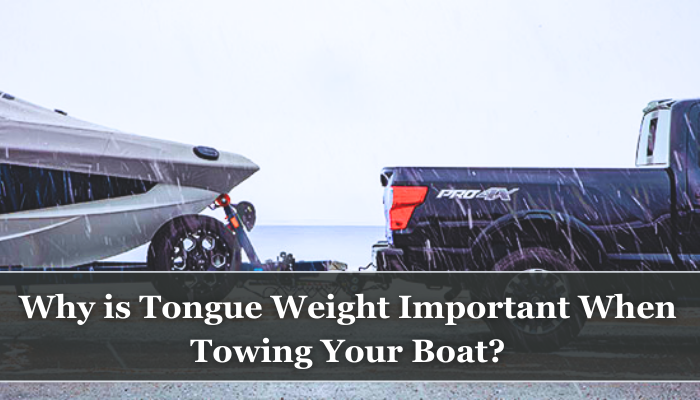This post may contain affiliate links which means I may receive a small commission for purchases made through the links. Learn More
When it comes to towing your boat, one of the most important things to consider is tongue weight. But what exactly is tongue weight and why is it so important?
Tongue weight plays a crucial role in towing a boat as an excessive or insufficient tongue weight can result in a less enjoyable towing experience. A high tongue weight can cause the boat to sway, making it challenging to handle the tow vehicle, while a low tongue weight can cause the rear of the boat to sag, compromising stability.
It was just an introduction but I have got a lot more information for you. In this blog post, I will dive into the details of tongue weight and explain why it’s crucial for a safe and enjoyable towing experience.
Related Article: How to Reduce Tongue Weight on a Trailer?
What is Tongue Weight?
Before I take you into details, you need to have some basic knowledge in your mind. Look, the tongue weight is the downward force exerted on the hitch of a tow vehicle by the trailer (boat). In other words, it’s the weight that the tow vehicle is carrying on the hitch.
Tongue weight is measured in pounds and is typically 10-15% of the total boat and trailer weight. For example, if your boat and trailer weigh a total of 9,000 pounds, the tongue weight should be between 700 and 950 pounds.
Why is Tongue Weight Important when Towing a Boat?
Tongue weight plays a crucial role in maintaining stability and safety while towing your boat. When the tongue weight is properly balanced, it helps to distribute the weight of the trailer evenly across the tow vehicle.
Note: Appropriate tongue weight helps to prevent issues such as swaying, fishtailing, and difficulty steering.
When the tongue weight is not properly balanced, it can lead to several problems. For example,
- If the tongue weight is too light, the back of the tow vehicle may lift, making it difficult to control.
- If the tongue weight is too heavy, it can cause the front of the tow vehicle to sag, making it difficult to steer.
Trust me or not, leaving the tongue weight unchecked can have very dangerous consequences as you can even face a severe accident.
Should You Consider Tongue Weight when Towing a Boat?
To be honest, yes, you should always pay special heed to tongue weight when towing a boat. If you leave it unchecked, it can have a bad impact on your driving comfort. Not only can it affect your driving, but it can cause trailer sway and even accidents.
I recommend everyone have the towing setup professionally weighed and adjusted if necessary to ensure that the tongue weight is within the recommended range. Otherwise, you can meet dangerous consequences if you don’t pay heed.
How to Measure the Tongue Weight of a Trailer Having a Boat on it?
Measuring tongue weight is relatively easy to do, and it’s something that you should do before each trip. Here are the steps to follow:
- First of all, make sure that the boat and trailer are loaded as they would be for your trip.
- The next step is to use a tongue weight scale or a bathroom scale to measure the weight of the tongue.
- Compare the measured weight to the recommended tongue weight for your trailer and boat.
- If you find very high or very low tongue weight, then adjust it to get the perfect readings.
It is noteworthy that the tongue weight should be measured when the boat and trailer are levels. This will ensure that you get an accurate reading.
How to Adjust the Tongue Weight of a Trailer with a Loaded Boat?
If you want to ensure the safe towing of your boat, it’s important to make sure that the tongue weight of the trailer is within the recommended range. As said earlier tongue weight is a crucial factor in determining the stability of the load and should be carefully monitored and adjusted as needed.
If the measured tongue weight is not within the ideal range, there are several ways to adjust it. The first step is to redistribute the weight of the load within the boat. This can be done by moving heavy items towards the front or the back of the boat depending on the type of imbalance you have.
For instance, if the tongue weight is too light, you can shift some of the weight from the front of the boat to the back, which will help to increase the tongue weight. On the other hand, if the tongue weight is too heavy, you can move some of the weight from the back to the front of the boat.
In addition to rearranging the weight within the boat, you can also add weight to the tongue. For example, you can place a heavy object such as a bag of sand or a cinder block in the front of the trailer. This will help to increase the tongue weight and bring it into balance.
Another solution to maintaining an ideal tongue weight is to use a weight distribution hitch. This type of hitch uses a series of springs and arms to distribute the weight of the trailer evenly across the tow vehicle. This helps to keep the tongue weight at the recommended level and ensures a stable towing experience.
Conclusion
Tongue weight is an important aspect when it comes to towing your boat. When your tow boat has an unbalanced tongue weight, then chances are high that you will suffer through a terrible driving experience as the trailer will sway around. Keep in mind that It’s always better to be safe than sorry, so make sure to keep an eye on your tongue weight while towing your boat. I hope that this guide will be helpful to you.

I’m Ahmad – the owner of this website and the writer of this post. I’ve spent 15 years in the automotive industry, especially among the hitches. What you’re reading is the experience of my 15 years.

